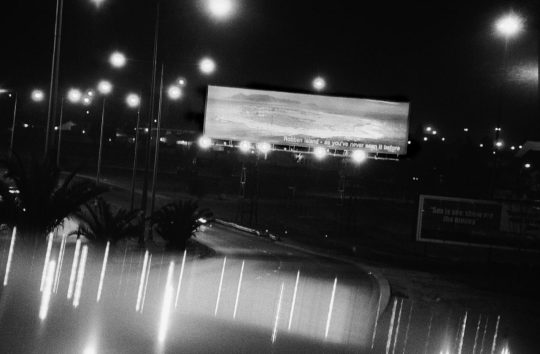#Santu Mofokeng
Explore tagged Tumblr posts
Text

Santu Mofokeng, Sacral Animals, Motouleng Cave, Clarens, 2004
2 notes
·
View notes
Text
Essay; Santu Mofokeng, A Fading World

Santu Mofokeng. Easter Sunday Church Service. 1996.
Looking at ‘Easter Sunday Church Service’ you get the sense that Santu Mofokeng is in search of something beyond the visible, only using the visible as a guide to get to the mystical; a smut surrounds the subjects as though carrying a purpose in itself within the space, conversely, the smut seemingly acknowledges the presence of the church goers - a dialogue with the laws of nature known to man, on the other hand, one’s humanity has not quite figured out yet - and so, as without the church goers, the space only exists in and of itself. That is the nature of Santu Mofokeng works, supernatural.
A key tangent to Mr Mofokeng’s work: It wasn’t until wooden furniture renderings not being up to par for companies did kodak develop film that considered the variety of brown shades, even then not of skin tones until the 90s, all the while - it strictly idealised the beauty standard being that of fairer skin and so it is no surprise that we find most Santu Mofokeng images in black and white.

The Drumming, Johannesburg-Soweto Line, From Train Church. 1986.

Train Church. 1986.
My attraction to the geniuses work is how he is able to achieve a sensation in his images without the boredom of conveyance, I find such an attraction at a time when we’re constantly bombarded with images..all of which are pristine, without emotion, only the perfectly fluorescent; all you’re seeing, is all there is to be seen. An article in the ‘New Yorker’ writes on the process of Santu Mofokengs work; “Mofokeng would often use exhausted chemicals to give his photographs an ethereal edge.” Seeing through ideas even after the camera is set down sets about a sense of connection to the works that is metamorphosed, fragile and nostalgic to fleeting moments seeing for the first time since shot.
Santu Mofokeng subject concerns has to do with capturing the intimate moments of the daily lives of black South Africans. Such an intrinsic search for a beauty outside of a system that shun tradition and culture so as to move the black community away from the soul of their being is a search for God. This approach was peculiar for the time as most photographers in South Africa were capturing the grotesque nature of the Apartheid regime.

Soweto. 1987
That world seems to have come to an end now, the search for sensation..in most painting work as well. Nonzuzo Gxekwa, Andile Bhala and Imraan Christian to mention only a few are however still in that realm and it’s beautiful to watch.

Chief More’s Funeral, GaMagopa. 1989.
Bibliography
Cole, T. (2017) ‘Victory in the Shadows’, The New York Times Magazine, 13 August, p. 12.
Color film was built for white people. Here’s what it did to dark skin. (2015). Vox. 18 September. Available at: https://youtu.be/d16LNHIEJzs (Accessed: 01 May 2023).
Onabanjo, O.C. (2020) ‘How Santu Mofokeng Shaped South African Photography’, The New Yorker, 24 February.
11 notes
·
View notes
Text
Santu Mofokeng

1 note
·
View note
Text

Santu Mofokeng, Robben Island as You Have Never Seen it Before, 2002
20 notes
·
View notes
Text

Christmas Church Service, Mautse Cave, 2000. Ph. Santu Mofokeng
2 notes
·
View notes
Text
«BLACK PAPER - Writing in a Dark Time» by TEJU COLE
I feel the sadness of the city, a sadness all the more powerful because everything around suggests that there is nothing to be sad about. «BLACK PAPER – Writing in a Dark Time» by TEJU COLE A new, beautifully disturbing essay collection by Teju Cole. If I am to highlight some of them … 1) “After Caravaggio”, a work of art in its own right. 2) “Gossamer World: On Santu Mofokeng”, a beautiful…

View On WordPress
7 notes
·
View notes
Text
Artistes Les Ami·e·s du Patchwork des noms, Bambanani Women’s Group, Bastille, yann beauvais, Black Audio Film Collective, Gregg Bordowitz, Jesse Darling, Moyra Davey, Guillaume Dustan, fierce pussy, Nan Goldin, Felix Gonzalez-Torres, Hervé Guibert, Barbara Hammer, Derek Jarman, Michel Journiac, Zoe Leonard, audrey liebot, Pascal Lièvre, Santu Mofokeng, Jean-Luc Moulène, Henrik Olesen, Bruno Pélassy, Benoît Piéron, Lili Reynaud-Dewar, Jimmy Robert, Régis Samba-Kounzi & Julien Devemy, Marion Scemama, Lionel Soukaz & Stéphane Gérard, Georges Tony Stoll, Philippe Thomas, David Wojnarowicz & arms ache avid aeon: fierce pussy amplified (Nancy Brooks Brody, Joy Episalla, Zoe Leonard, Carrie Yamaoka, fierce pussy and Jo-ey Tang)
Curator François Piron
Scientific advisor Elisabeth Lebovici
Curatorial assistant Clément Raveu
Exhibition assistant Rose Vidal
3 notes
·
View notes
Text
“Once in a while I make portraits,and some of them I’m proud of, but I can’t say I’m a portrait photographer.”- Santu Mofokeng, Aperture Magazine
0 notes
Text
"Books are a way of domesticating meaning" - Santu Mofokeng
November 14th, 2023
Quote by Mofokeng regarding his writing for his photography and his journey to become better at writing.
0 notes
Text

Santu Mofokeng
Opening Song, Hand Clapping and Bells, 1986
From the series Train Church
Gelatin silver print
9 notes
·
View notes
Text

Santu Mofokeng, Eyes-Wide-Shut, Motouleng Cave, Clarens, 2004
1 note
·
View note
Photo

Santu Mofokeng, Mkansi Household, Bedroom with Graffiti and the Clothes of their Late Parents, 2007
#santu mofokeng#interior#graffiti#photography#south africa#art#mkansi#bedroom#dead parents#grupa o.k.
75 notes
·
View notes
Text
Santu Mofokeng’s ‘Eyes-Wide-Shut’ | Frieze

1 note
·
View note
Photo

Supplication, Johannesburg-Soweto Line (1986) - Santu Mofokeng
10 notes
·
View notes
Photo

Santu Mofokeng | Soweto, 1985
111 notes
·
View notes
